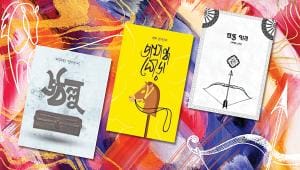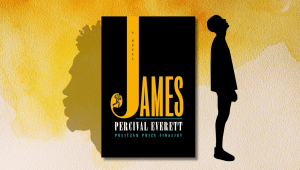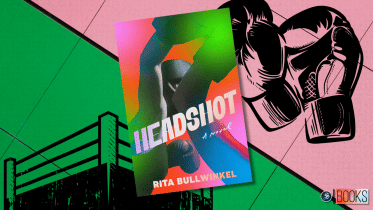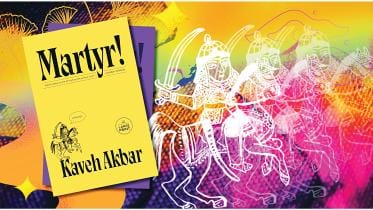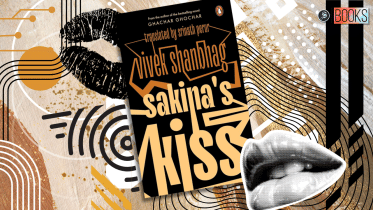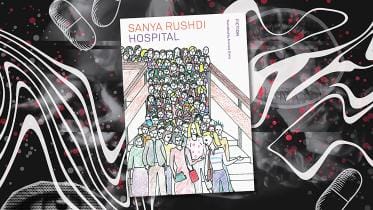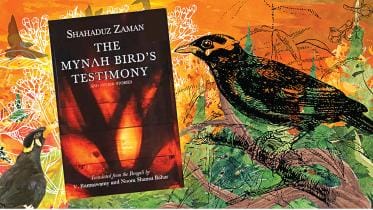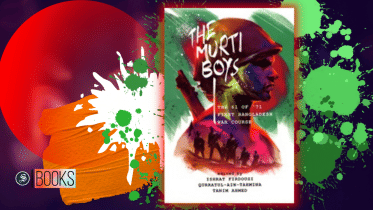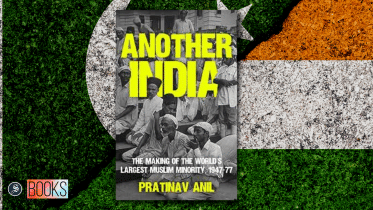A “knockout” debut from Rita Bullwinkel
The eight girls in Headshot clearly hope to escape the chaos of their lives in the ring.
17 August 2024, 13:45 PM
Whom is the propaganda on X for?
The disinformation game is now increasingly a part of our political makeup.
10 August 2024, 10:30 AM
Rabindranath’s rebellion
“The liberation that comes through sorrow is greater than the sorrow,” says Nikhilesh, in Home and the World. I quote from Penguin’s Modern Classics edition, in Sreejata Guha’s translation.
9 August 2024, 18:00 PM
We must never let such an environment of fear reign again
Fear cannot ever lead to forgetting.
7 August 2024, 04:00 AM
When death is a performance
Kaveh Akbar’s Martyr! is unruly and endearing. Akbar’s years as a poet has given his debut novel an honesty that shines through the book’s arduous structure. And for all of Martyr!’s exhilarating tone and emotional trek, the difficulties of writing a novel on addiction, martyrdom, death, and meaning is evident when one reads it.
10 July 2024, 18:00 PM
Celebrating the best of Bengali short fiction
Bengali literature has had a rich history of prose, beginning more or less in the early 19th century under the colonial Raj.
12 June 2024, 18:00 PM
Unseen chains of consequences
When a few boys arrive at the couple’s flat to seek out their college-going daughter, Rekha, the parents are thrown into a whirlwind of adventure.
29 May 2024, 13:45 PM
Hair cream
The mosque committee was quite displeased with Rashed, their young muezzin.
17 May 2024, 18:00 PM
Human passions in Kurosawa’s Shakespeare
Shakespeare’s enduring international appeal is in part due to the remarkable personalities he had invented.
3 May 2024, 18:00 PM
The Precious O
That split second when the rubber slaps your skin and stays, when there is a click of a switch, a levitation, a lightness of your body—everyone remembers the first time they are knocked out, everyone except Mr Suleyman Khar, regional light-heavyweight titleist,
19 April 2024, 18:00 PM
Meditations on sanity in ‘Hospital’
Though on its surface Sanya Rushdi’s Hospital, translated into English by Arunava Sinha and recently longlisted for the 2024 Stella Prize, looks to be a breezy, short read—it is anything but. With her rather flattened, sparse prose, Rushdi has managed to write an enduring piece of autofiction, a compelling account of psychosis that neither sensationalises nor withers away any sentimentality from the struggles of mental health.
27 March 2024, 18:00 PM
The enchanting realism in Shahaduz Zaman’s ‘The Mynah Bird’s Testimony’
Shahaduz Zaman is a familiar face in Bangladeshi literature, whose literary career spans decades of fruitful work. He regularly writes columns for Bangla newspapers, has written a few notable biographical fiction, such as Ekjon Komolalebu (Prothoma, 2017), based around the life of Jibanananda Das, and has garnered some duly needed appreciation for ethnographic work on the history of medicine during the liberation war.
14 February 2024, 18:00 PM
Jhumpa Lahiri’s Italian renovations
Jhumpa Lahiri has always been the rare author whose prowess in the art of the short-story far surpassed her novelistic talents.
3 January 2024, 18:00 PM
The futuristic post-punk world of Izumi Suzuki
More than anything, Suzuki shows that the key to being an alien is not to be outlandish but to be sickeningly more human.
13 December 2023, 13:55 PM
Despair and death in ‘Truth or Dare’
Bangladeshi literature in English has had a considerably late start compared to its South Asian counterparts in India and Pakistan. A few exceptions aside, a consistency came to be seen only by the early 2010s.
22 November 2023, 18:00 PM
In search of American freedoms
Increasingly over the years, American literary fiction has centered upon rage—a rage brought on by family, one’s own identity or, through the very cruelty of economic catastrophe.
18 October 2023, 18:00 PM
An underwhelming kidnapping
Perhaps the book's biggest fault is that it ends up being (unintentionally or not) a response to Nabokov’s Lolita.
13 October 2023, 15:55 PM
The records of resilience
Much of the reminiscences in The Murti Boys encompass the grittiness of staving off the Pakistanis with little weaponry and a great deal of quick thinking.
19 September 2023, 15:00 PM
The occult thrills of ‘The Centre’
Rarely does a book arrive, a debut no less, that feels as inventive and accomplished as Ayesha Manazir Siddiqi’s The Centre. Her novel is built on the crossroads of interpretation and ownership, of the power of language and of those privileged enough to reclaim it.
13 September 2023, 18:00 PM
The minority report in India
In Another India, Pratinav Anil unambiguously faults Nehruvian secularism—the very mantle championed by historians such as Mushirul Hasan for whom “the congress best represented the Muslim interests from the fifties on.”
28 August 2023, 13:55 PM






